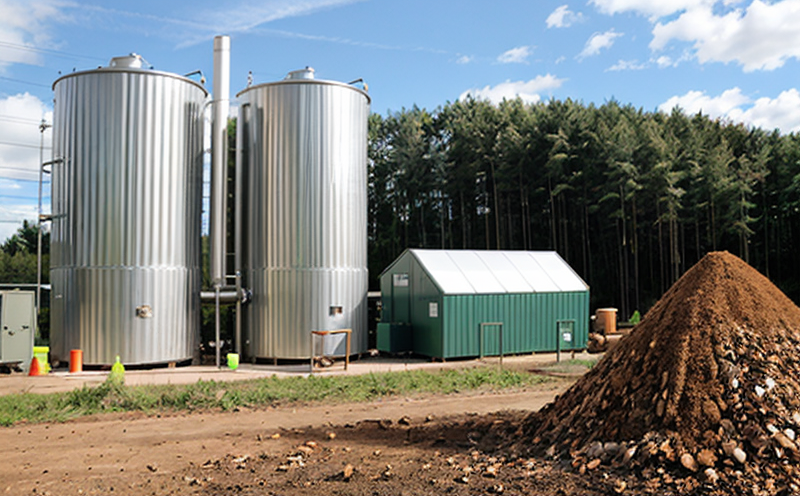ASTM D7348 Loss on Ignition of Refuse-Derived Fuels
The ASTM Standard Practice D7348 specifies the procedure for determining the loss on ignition (LOI) of refuse-derived fuels (RDF). This is a critical parameter in waste-to-energy conversion processes, as it helps assess the calorific value and potential energy content of RDF. The LOI test measures how much mass is lost from a sample when exposed to high temperatures under controlled conditions.
ASTM D7348 is widely used by quality managers, compliance officers, R&D engineers, and procurement teams in waste management and recycling industries. This standard ensures that the RDF meets specific criteria for energy content which are crucial for efficient combustion processes in waste-to-energy plants. Understanding the LOI value helps in optimizing fuel blends to achieve maximum energy output while minimizing emissions.
The test procedure involves drying the sample, igniting it, and then measuring the mass loss after reaching a constant weight at 850°C ± 25°C for one hour. The result is expressed as a percentage of the initial mass. This method provides valuable insights into the quality and suitability of RDF for energy conversion.
For accurate results, proper sample preparation is essential. Samples should be homogenized to ensure even heating during the test. Common specimens include shredded paper, plastic, textiles, and other combustible materials collected from municipal waste streams.
The ASTM D7348 procedure ensures that the testing laboratory adheres to international standards for precision and accuracy. It is important to note that results can vary depending on sample composition and pre-treatment methods. Therefore, consistent methodology across laboratories is crucial for meaningful comparisons and compliance with regulatory requirements.
Understanding ASTM D7348 goes beyond just the technical aspects of the test. It involves knowing how different types of waste materials behave under high temperatures and why this metric is significant in energy conversion processes. By mastering ASTM D7348, stakeholders can make informed decisions about RDF quality, optimize fuel blends for better efficiency, and ensure compliance with local regulations.
Scope and Methodology
The scope of ASTM D7348 is to provide a standardized method for determining the loss on ignition (LOI) of refuse-derived fuels. This standard applies to RDF used in waste-to-energy conversion processes, ensuring that the fuel meets specified criteria regarding its calorific value.
- Sample Preparation: The specimen should be finely ground or shredded to ensure uniformity and ease of handling during the test.
- Drying: Samples are dried at 105°C ± 2°C in an oven until constant weight is achieved. This step removes moisture content, ensuring accurate LOI results.
- Ignition: The dried sample is then placed in a muffle furnace and ignited at 850°C ± 25°C for one hour under controlled atmospheric conditions (usually air).
- Weighing: After the ignition period, the sample is allowed to cool, and its mass is measured. The difference between the initial and final masses represents the LOI percentage.
The methodology outlined in ASTM D7348 ensures that all laboratories performing this test follow a consistent procedure, leading to reliable and reproducible results. This standard also helps in establishing quality control measures within waste management facilities by providing clear guidelines on sample preparation, testing conditions, and data interpretation.
Quality and Reliability Assurance
The ASTM D7348 procedure places a strong emphasis on the accuracy and reliability of loss on ignition (LOI) measurements. Laboratories must adhere to strict quality control measures to ensure consistent results across different samples and batches.
- Calibration: Laboratory equipment, including muffle furnaces, balances, and drying ovens, must be regularly calibrated according to manufacturer specifications and industry standards.
- Standard Operating Procedures (SOPs): SOPs are crucial for maintaining consistency in sample preparation and testing. These procedures should include detailed steps for drying, ignition, cooling, and weighing.
- Data Validation: Laboratories employ statistical methods to validate test results, ensuring that they fall within acceptable ranges defined by the standard.
In addition to these technical measures, laboratories must also maintain comprehensive documentation of all testing processes. This includes records of sample preparation, drying times, temperatures during ignition, and final mass measurements.
Regular audits conducted internally or externally help identify any discrepancies in adherence to ASTM D7348. Continuous training for laboratory personnel ensures that they are up-to-date with the latest methodologies and best practices.
The reliability of ASTM D7348 results is further enhanced by the use of reference materials (RMs) in laboratories. RM certification guarantees traceability to national or international standards, providing additional confidence in the accuracy and precision of the test results.
Use Cases and Application Examples
- R&D for RDF: ASTM D7348 is used by R&D teams to refine fuel blends and optimize RDF compositions for improved calorific value. By testing various waste materials, they can identify the most suitable feedstocks for efficient energy conversion.
- Quality Control: Compliance officers use this standard to ensure that RDF meets specified quality thresholds set by regulatory bodies or internal standards. This helps in maintaining consistent fuel quality and performance across different batches.
- Purchase Specifications: Procurement teams can rely on ASTM D7348 results when specifying RDF for energy conversion plants. It ensures that the selected RDF suppliers meet stringent quality criteria, leading to reliable and efficient operations.
In real-world applications, waste-to-energy facilities often use a combination of different types of RDF with varying LOI values. By analyzing these values, operators can adjust fuel blends to optimize combustion efficiency and minimize emissions. This is particularly important in achieving the goals set by international agreements like the Paris Agreement.
ASTM D7348 also plays a crucial role in research projects focused on developing new technologies for RDF production and utilization. For instance, it helps in validating the effectiveness of advanced recycling processes that aim to produce higher quality RDF with consistent LOI values.





